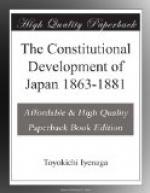“The place where we live is the Emperor’s land and the food which we eat is grown by the Emperor’s men. How can we make it our own? We now reverently offer up the list of our possessions and men, with the prayer that the Emperor will take good measures for rewarding those to whom reward is due and for taking from those to whom punishment is due. Let the imperial orders be issued for altering and remodelling the territories of the various clans. Let the civil and penal codes, the military laws down to the rules for uniform and the construction of engines of war, all proceed from the Emperor; let all the affairs of the empire, great and small, be referred to him.”
This memorial was signed by the Daimios of Kago, Hizen, Satsuma, Choshiu, Tosa, and some other Daimios of the west. But the real author of the memorial is believed to have been Kido, the brain of the Restoration.
Thus were the fiefs of the most powerful and most wealthy Daimios voluntarily offered to the Emperor. The other Daimios soon followed the example of their colleagues. And the feudalism which had existed in Japan for over eight centuries was abolished by the following laconic imperial decree of August, 1871:
“The clans are abolished, and prefectures are established in their places.”
This rather off-hand way of destroying an institution, whose overthrow in Europe required the combined efforts of ambitious kings and emperors, of free cities, of zealous religious sects, and cost centuries of bloodshed, has been made a matter of much comment in the West. One writer exclaims, “History does not record another instance where changes of such magnitude ever occurred within so short a time, and it is astonishing that it only required eleven words to destroy the ambition and power of a proud nobility that had with imperious will directed the destiny of Japan for more than five hundred years."[2]
But when we examine closely the circumstances which led to the overthrow of feudalism and the influences which acted upon it, we cannot but regard it as the natural terminus of the political flood which was sweeping over the country. When such a revolution of thought as that expressed in the proclamation of 1868 had taken place in the minds of the leaders of society, when contact with foreigners had fostered the necessity of national union, when the spirit of loyalty of the Samurai had changed to loyalty to his Emperor, when his patriotic devotion to his province had changed to patriotic devotion to his country, then it became apparent that the petty social organization, which was antagonistic to these national principles, would soon be crushed.




